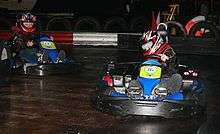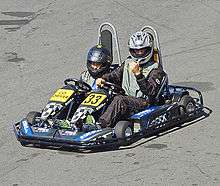Go-kart



A go-kart, also written as go-cart (often referred to as simply a kart), is a type of open-wheel car. Go-karts come in all shapes and forms, from motorless models to high-powered racing machines. Some, such as Superkarts, are able to beat racing cars or motorcycles on long circuits.
Gravity racers, usually referred to as Soap Box Derby carts, are the simplest type of go-karts. They are propelled by gravity, with some races taking place down a single hill.
Recreational karts can be powered by four-stroke engines or electric motors, while racing karts use a two-stroke or, rarely, higher powered four-stroke engines. Most of them are single seater but some recreational models can accommodate a passenger.
In some countries, go-karts can be licensed for use on public roads. Typically there are some restrictions, e.g. in the European Union a go-kart on the road needs head light (high/low beam), tail lights, a horn and indicators, and their power must not exceed 20 hp (15 kW).
Recreational, concession and indoor karts
Besides traditional kart racing, many commercial enterprises offer karts for rent, often called "recreational" or "concession" karts. The tracks can be indoor or outdoor. Karts are rented by sessions (usually from 10 to 30 minutes). They use sturdy chassis complete with dedicated bodywork, providing driver safety. Most of these enterprises use an "Arrive and Drive" format which provide customers with all the safety gear (helmets, gloves and driver outfits) necessary, and allow them to show up any time to race at a reasonable price, without the problem of having to own their own equipment and gear.
Outdoor tracks can offer low speed karts strictly for amusement (dedicated chassis equipped with low powered four-stroke engines or electric motors), or faster, more powerful karts, similar to a racing kart, powered by four-stroke engines up to 15 hp (11 kW) and, more rarely, by 2-stroke engines, but designed to be more robust for rental use. Typically, outdoor tracks are also be used for traditional kart races.
Indoor kart tracks can be found in many large cities in different parts of the world. These tracks are often located in refurbished factories or warehouses, and are typically shorter than traditional outdoor tracks. Indoor karts are usually powered by a four-stroke gasoline engine producing anywhere from 5 to 13 hp (4 to 10 kW), or sometimes by an electric motor. Many tracks offer competitive races and leagues. At the top level, an Indoor Karting World Championship (IKWC)[1] exists.
Engines
Power is transmitted from the engine to the rear axle by way of a chain (some rentals use a belt).
- Four-stroke engines can be standard air-cooled industrial based engines, sometimes with small modifications, developing from about 5 to 20 hp (4 to 15 kW). Briggs & Stratton, Tecumseh (company closed in 2008), Kohler, Robin, and Honda are manufacturers of such engines. They are adequate for racing and fun kart applications. There are also more powerful two-stroke engines available from manufacturers like Yamaha, KTM, Biland, or Aixro (Wankel engine) offering from 15 to 48 hp (11 to 36 kW). They run at up to 11,000 rpm, and are manufactured specifically for karting. PRD makes the PRD Fireball, a two-stroke engine delivering 28.5 hp (21 kW) at 15,580 rpm.
- Electric go-karts are low maintenance, requiring only that the lead-acid batteries of the karts are plugged into an array of chargers after each run. Since they are pollution-free and emit no smoke, the racetracks can be indoors in controlled environments. Most fully charged electric karts can run a maximum of 20 minutes before performance is affected. Some karts have been fitted with hydrogen fuel cells.[2]
External controls
Go-karts used in amusement parks can be fitted with additional electronic controls, such as remote speed limiters, to help promote a safer operating environment. In the event of an accident or an out of control racer, the track attendant can remotely slow or stop all vehicles on the track via radio control. This remote speed control can also be used to limit young riders to a slow operating speed, while a race consisting only of adults is permitted a higher speed. These controls can be applied to both electric and combustion-engine karts.
See also
- Crosskart
- Cyclekart
- Electrathon
- Formula Zero
- Forze
- Greenpower
- Hobcart
- Kart racing
- Micro kart
- Off road go-kart
- Karting in media